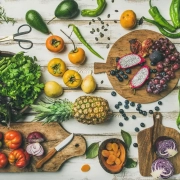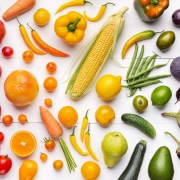Plants Have More Protective Properties Against Alzheimer’s Than Pills
Reading Time: 3 minutes
Alzheimer’s disease is one of the most dreaded diseases that inflict the elderly. Conventional medicines are used to slow down the progression of the disease, but they do not prevent or reduce your likelihood of stopping this condition. While there is no cure for this particular disease yet, your likelihood of developing it can be reduced.
Dr. Neal Barnard, founding president of the Physician Committee for Responsible Medicine (PCRM), noted that while popping pills can slow down the disease, they don’t prevent the onset of its occurrence. In his book “Power Foods for The Brain,” he discusses that certain foods can help protect your brain against Alzheimer’s disease.
Eat Plants to Protect Your Brain
There are many foods that you can eat for your brain but there are only a few that provides your brain with a shield. These plants with concentrations of certain vitamins including Vitamin E and B Vitamins (B6, B12, and folic acid). These vitamins help protect the brain from cognitive impairment when ingested especially together with a plant-based diet.
While these vitamins are good for the brain, they can cause harm if taken in huge amounts. For instance, large doses of Vitamin E can increase the risk of heart disease while high amounts of folate increase the risk for cancer. The thing is, the body has evolved to procure micronutrients through the food that we eat. Consumption of high doses of vitamins is not natural for the body and can possibly cause more harm than good.
How to Get Vitamins Trough the Food You Eat
The best way to get micronutrients that are good for the brain is by eating the right kinds of food. But how do you get micronutrients from the food that you eat? It is important that you know that plants are one of the best ways to get the micronutrients that you need. For instance, you can get traces of Vitamin E from green leafy vegetables like broccoli and spinach. You can also get Vitamin E from mangoes, sweet potatoes, and avocados. Other sources include pine nuts, hazelnuts, sunflower seeds, flaxseed, sesame seeds, and pistachios. Although you only get 5mg of Vitamin E from these foods, you can reduce your risk by as much as 26%.
When it comes to Vitamin B6, you can consume whole greens, leafy greens, sweet potatoes, beans, nuts, and bananas. Folate can be sourced from leafy greens, peas, citrus fruits, and cantaloupes. Now the challenge here is Vitamin B12 as it is made by bacteria found in dirt. It is also found in meat. To compensate, you can consume a 1000mg B12 supplement daily especially if you are not a meat eater.
Many people believe that Alzheimer’s disease is a brain disease, but recent studies noted that it is a vascular disease as patients who suffer from this disease have clogged up arteries in the brain, which is a tell-tale sign of a vascular disease. Having said this, what is good for the heart should also be good for the brain and consumption of more plant-based foods is definitely good not only good for the hear but also for the brain.
Inspired by www.postindependent.com
Are you a food manufacturer looking to add more plant-based vitamins to your products?
Let us help you! We developed our GrandFuion fruit and vegetable blends to concentrate and stabilize the natural vitamins found in these important foods. Food manufacturers of snacks, supplements, beverages, and pet food have used our products to deliver plant-based vitamins at a standardized level. Interested in learning more? Download our R&D resource kit today!







